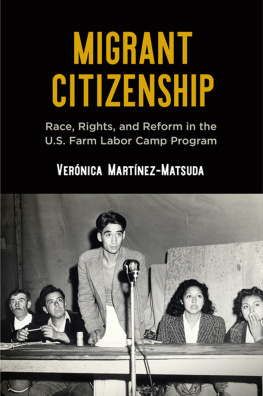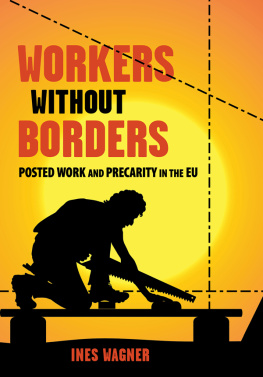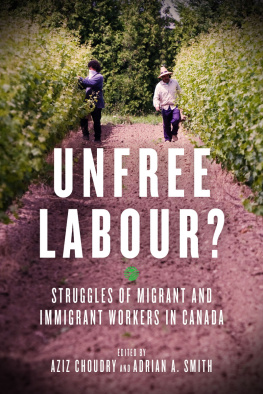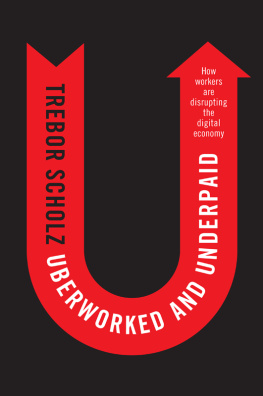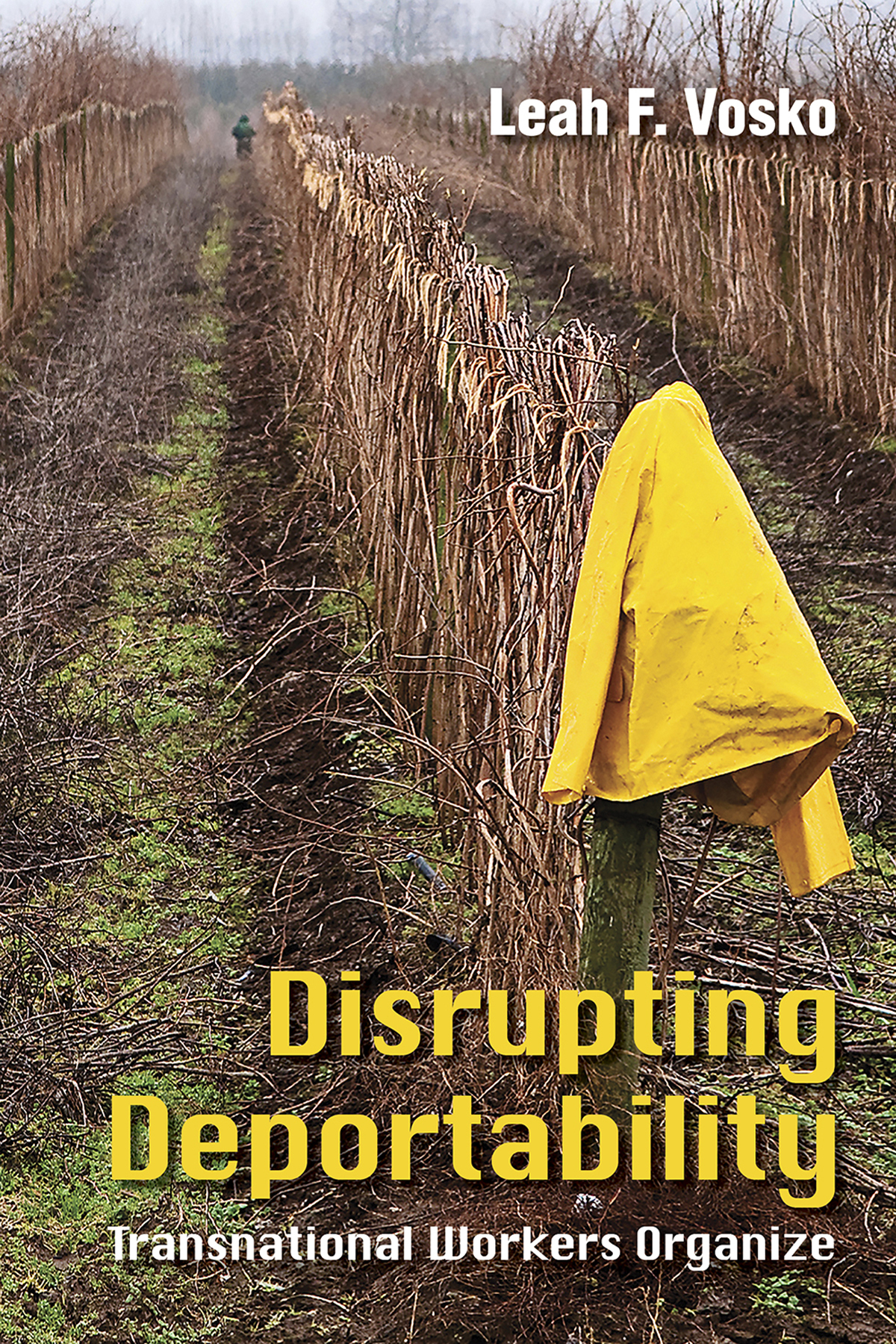Copyright 2019 by Leah F. Vosko
All rights reserved. Except for brief quotations in a review, this book, or parts thereof, must not be reproduced in any form without permission in writing from the publisher. For information, address Cornell University Press, Sage House, 512 East State Street, Ithaca, New York 14850. Visit our website at cornellpress.cornell.edu.
Librarians: A CIP catalog record for this book is available from the Library of Congress.
Cover photograph: A temporary migrant worker in a British Columbia raspberry field as the growing season comes to a close. Photo by Cheryl Wiens.
Acknowledgments
When I embarked on the research culminating in this work, I did not anticipate that my investigation would result in a book. However, as I came to understand the nature and depth of the challenges facing workers laboring transnationally, especially those seeking to organize to minimize threats and acts of removal, I realized that what follows is a story that needs to be told.
Several institutions and organizations provided me with the opportunity, time, and space to write this book, and a number of individuals supported me along the way. Institutionally, I owe a great debt to the United Food and Commercial Workers (UFCW) Canada for granting me access to their archive of materials surrounding the legal cases examined herein and to staff members of Local 1518 in British Columbia (BC), as well as Hastings Law, Vancouver, for helping me navigate their immensity. Although I do not list their names here because many staff members also served as research participants, I extend my sincere thanks to these individuals whose abiding commitment to improving the situation of migrant workers made a lasting impression on me. One individual, however, a nonparticipant who helped pave the way for my research, deserves acknowledgment: Naveen Mehta, UFCW Canadas General Counsel and Director of Diversity & Inclusion. For their financial support, I am likewise grateful to the Canada Research Chairs Program and to York University, especially its Office of the Vice-President Research & Innovation and Faculty of Liberal Arts & Professional Studies, which serves as my institutional home. The idea for this book first took shape at Cornell University, where during a sabbatical I had the pleasure of participating in a yearlong weekly research seminar, Immigration: Settlement, Integration, and Membership, attended by Cornell faculty across the social sciences and several scholars from elsewhere. I am grateful to all of the participants in this seminar and especially to Michael Jones-Correa, its convener, and to coparticipant Maria Cook, who, along with Lance Compa, also offered me helpful feedback at an early stage, and invited and welcomed me to Cornell.
I initially undertook research for Disrupting Deportability in parallel with another project, a collaborative initiative resulting in the coedited volume Liberating Temporariness: Migration, Work, and Citizenship in an Age of Insecurity (2014). In connection with this project, I had countless helpful conversations with my coeditors and close York-based colleagues Valerie Preston and Robert Latham, as well as the contributors to Liberating Temporariness and an allied seminar on this theme. Along the way, I also benefited from many exchanges with, and input from, another wonderful York-based colleague, Eric Tucker: Erics advice was always spot on, and his challenging yet consistently encouraging comments made a huge difference to me. Outside York, I am similarly grateful to William Walters, who read segments of the manuscript and offered instructive input and critique at an important moment in the writing process, and to Katherine Lippel for her ongoing interest and polite prodding about the progress of the project.
Many colleagues, both within and beyond the academy, invited me to present research related to Disrupting Deportability and/or attended presentations and offered critical feedback: I thank, in particular, Adelle Blackett, Barbara Cameron, Christina Gabriel, Amanda Glasbeek, Luin Goldring, Jennifer Hyndman, Barbara Neis, Chris Ramsaroop, and Deirdre Walsh. I also benefitedand learned a great dealfrom interacting with the graduate research assistants who tenaciously helped me locate, organize, and navigate the large volume of documentation on which the analysis in this book relies. Nicole Bernhardt, Tyler Chartrand, Olena Lyubchenko, Corey Ranford, and Cynthia Spring each assisted me at vital stagesand I thank them for their diligence and commitment. Additionally, as I wrote Disrupting Deportability, I had the pleasure of working with four outstanding administratorsKim McIntyre, Alice Romo, Heather Steel, and Aparna Sundarwhose support for allied projects gave me the space to complete the manuscript. And after submitting the manuscript, I received insightful anonymous reviews from external referees and members of the ILRs external editorial board, as well as valuable editorial support from Fran Benson. Subsequently, I was delighted to discover the wonderful photographic work of BC-based Cheryl Wiens, which appears on the front cover. As Cheryl explained to me, this image depicts a temporary migrant worker in a BC raspberry field at the end of the season. By capturing the jacket at the end of the row together with the worker who is visible but at a distance from it, the image conveys the transnational realities of workers employment situations, the loneliness and isolation flowing from them, and the deportability upon which they rest. I am grateful to Cheryl for permitting me to use her photograph in this work.
Fortunately, I have an incredibly supportive network of family and friends and, in the case of this project, a welcoming BC family. I thank my sister, Judith Vosko, and her family for supporting me as I pursued the fieldwork for this project and, more generally, for their love and support. I am also eternally grateful to my mother, Phyllis Vosko, for her unending love and encouragement and for putting up with the lengthy absences of her grandson, and to my father-in-law, Morry Kernerman, for his consistent enthusiasm for my research and for always engaging me in stimulating conversations on related subjects. This project would never have come to pass were it not for my dear friend Kathy McGrenera (aka Auntie Kathy) and her community (especially my Elise McGrenera and Nancy Marion), who embraced much of my extended family, summer after summer, as I conducted fieldwork. In Vancouver, my fantastic friends Jacky Coates, Marjorie Cohen, Sylvia Fuller, Brenda Kilpatrick, and Michelle Dodds, never ceased being interested in my research. Likewise, back East, several of my friends, especially Deborah Clipperton, May and Dan Friedman, Mary Gellatly, Deena Ladd, Stacey Mayhall, Kiran Mirchandani, Laurell Ritchie, Lisa Roy, Renuka Satchithananthan, Peter Unwin, and Marion Werner, never failed to listen attentively to the story I seek to tell in this book.
I began the research for


